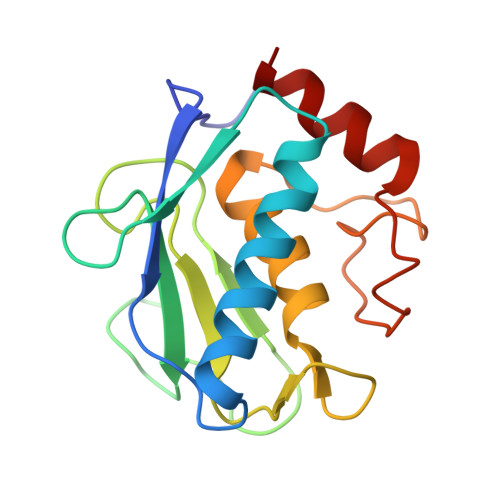Crystallization of bi-functional ligand protein complexes.
Antoni, C., Vera, L., Devel, L., Catalani, M.P., Czarny, B., Cassar-Lajeunesse, E., Nuti, E., Rossello, A., Dive, V., Stura, E.A.(2013) J Struct Biol 182: 246-254
- PubMed: 23567804
- DOI: https://doi.org/10.1016/j.jsb.2013.03.015
- Primary Citation of Related Structures:
4H1Q, 4H2E, 4H30, 4H3X, 4H49, 4H76, 4H82, 4H84, 4HMA, 4I03 - PubMed Abstract:
Homodimerization is important in signal transduction and can play a crucial role in many other biological systems. To obtaining structural information for the design of molecules able to control the signalization pathways, the proteins involved will have to be crystallized in complex with ligands that induce dimerization. Bi-functional drugs have been generated by linking two ligands together chemically and the relative crystallizability of complexes with mono-functional and bi-functional ligands has been evaluated. There are problems associated with crystallization with such ligands, but overall, the advantages appear to be greater than the drawbacks. The study involves two matrix metalloproteinases, MMP-12 and MMP-9. Using flexible and rigid linkers we show that it is possible to control the crystal packing and that by changing the ligand-enzyme stoichiometric ratio, one can toggle between having one bi-functional ligand binding to two enzymes and having the same ligand bound to each enzyme. The nature of linker and its point of attachment on the ligand can be varied to aid crystallization, and such variations can also provide valuable structural information about the interactions made by the linker with the protein. We report here the crystallization and structure determination of seven ligand-dimerized complexes. These results suggest that the use of bi-functional drugs can be extended beyond the realm of protein dimerization to include all drug design projects.
Organizational Affiliation:
CEA, iBiTec-S, Service d'Ingénierie Moléculaire des Protéines-SIMOPRO, Gif-sur-Yvette F-91191, France. antoni.claudia@cea.fr




















